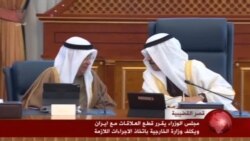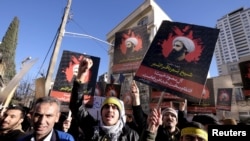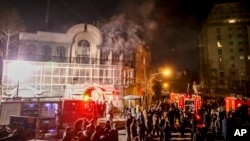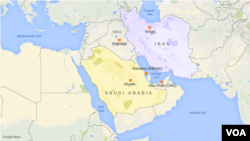As Saudi diplomats return from Iran after the severing of diplomatic relations, protests continue in neighboring Bahrain over the Saudi kingdom’s execution of Shi’ite cleric Nimr al-Nimr.
The cleric, along with 46 other condemned men, was executed on Saturday, prompting protests from Shi’ite groups around the world against the Sunni Saudi Arabian monarchy.
The mass executions appeared to be a show of strength by a country surrounded by turmoil and deeply concerned about potential unrest in its oil-rich Eastern Province, according to analysts.
“Saudi Arabia wants to portray itself as a strong country that can stop any opposition in its Eastern Province, or anywhere else,” says Khalifa Gaballah, the Arab affairs editor at Masry al-Youm, a prominent Egyptian newspaper. “Saudi Arabia is a massive state in an area surrounded by conflicts.”
Unrest to the east
As the protests in Bahrain continue, Saudi leaders fear that the unrest could spill into its Eastern Province, where the mostly-Shi’ite population has long complained of marginalization – Such fears, says Gulf State Analytics founder Giorgio Cafiero, are not unfounded.
“We should be keeping a close eye on events in Bahrain,” he said. “In the Shia villages of Bahrain, protesters have expressed their solidarity with their counterparts in Saudi Arabia’s Eastern Province,” Cafiero said.
Beyond inciting unrest in Saudi Arabia, sectarian strife in Bahrain could provide an opportunity for Islamic State militants to exploit the chaos, targeting the tiny, strategically located nation.
Bahrain - located off the eastern coast of Saudi Arabia - has a Shi’ite majority population and a Sunni monarch in charge.
While Shi’ite protesters continue to express their anger at the Saudi government, officials in Bahrain have followed the lead of Saudi Arabia and its Sunni allies. Bahrain, the United Arab Emirates, Qatar, Sudan and Kuwait have all cut or downgraded diplomatic ties with Shi’ite-dominated Iran after protesters attacked the Saudi embassy in Tehran.
Saudi Arabia accuses Iran of meddling in the affairs of foreign countries, including Bahrain. Saudi television channel Al-Arabiya reported Wednesday six people had been arrested in Bahrain, accused of being part of a “terrorist cell” associated with Iran and Iranian-backed Hezbollah.
Threats from within and beyond
It’s not just Shi’ite dissidents worrying the Saudi government, according to Cafiero. All of the men executed were convicted terrorists, with 43 being affiliated with al-Qaida, a group that self-identifies as Sunni.
Islamic State militants also issued a threat against the Saudi government online on Tuesday.
"The Islamic State always seeks to free prisoners, but we calculate that the ending of the issues of prisoners will not happen except with the eradication of the rule of tyrants, and then destroying their prisons and razing them to the ground," it reads.
Saudi Arabia is also bogged down with fighting in Yemen and involved in the Syria and Libya wars, according to Gulf State Analytics’ Dubai-based senior adviser Theodore Karasik.
The diplomatic dispute, he adds, could be in part an attempt to shift geopolitical alliances as a way to manipulate potential conflict resolutions to be more favorable to maintaining or growing Saudi power.
Conversely, Iran has reason to use the diplomatic break to potentially grow its international standing, he says.
“Iran can argue that the al-Sauds are incapable of governing their kingdom,” he explained.
Shi’ite groups in other parts of the region have also vowed revenge for al-Nimr’s death. In Iraq, two Sunni mosques were attacked in apparent retaliation for the execution.
And given the depth of the Sunni-Shi’ite divide in many parts of the Middle East and beyond, says Gaballah, from Masry al-Youm, the Saudi Arabia-Iran dispute could mean widespread violence if it is not resolved soon.
“I believe this conflict is impacting the whole region,” he said. “It’s most dangerous for the Gulf, but if this crisis is not contained swiftly, it may lead to conflicts in many other parts of the region.”









